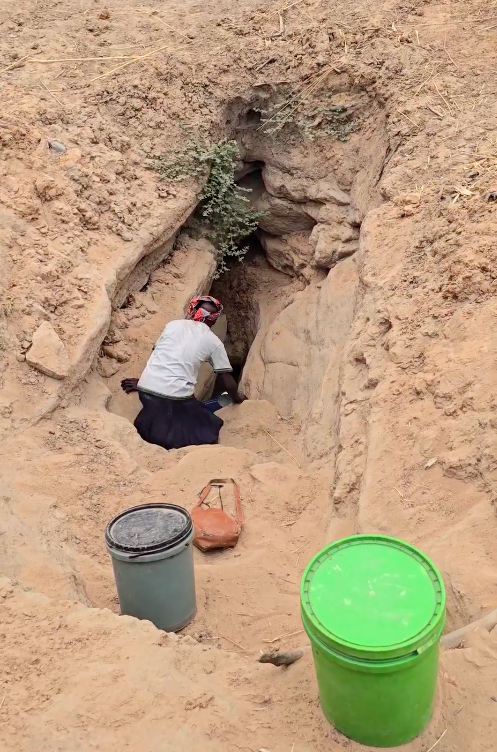
Gendered Impacts of Climate Change in Zimbabwe

Climate change is disproportionately impacting women in rural communities in Zimbabwe. Culturally, women are primarily responsible for domestic responsibilities such as such as fetching water, providing food for their families, and keeping their households clean.
Environmental changes driven by climate change, such as more frequent droughts and irregular rainfall, are making it increasingly difficult to carry out these tasks.
Many women spend hours traveling long distances to queue for water, in some cases waking up as early as 2:00 AM and traveling up to 15 kilometers to reach the water collection point. Many water points have an unreliable supply and recharge slowly, often forcing women to wait for several hours just to fill their containers. At times this process may be repeated multiple times a day to meet a household's water needs. This responsibility has impacts on women's health, safety, and marriages.
During a field visit in October 2024, my supervisor, Dr. Wendy Kroeker, and I conducted a focus group at a water pump borehole, where we spoke with women who had been waiting in line for several hours. They described how queueing for water was part of their daily routine and demonstrated how the replenished borehole only had enough water for two or three women to fill their buckets. The other women in the queue would have to continue waiting for the borehole to recharge.
Waiting at water points exposes women to vulnerabilities, including conflict, violence, and health risks. Because water is scare, conflicts arise between women over how much water each woman should be allowed to collect. The psychosocial stress of providing for their families with limited resources available can take a toll on women's wellbeing, causing feelings of anxiety and stress. Additionally, traveling long distances to reach the water point also puts women at risk of gender-based violence and physical health challenges such as back and leg pain.
After a focus group discussion, some women showed us the challenges of fetching water in their community by taking us to the dam where they collect water. One woman climbed down the steep walls of the water hole to the small pool of water below that must sustain the entire community. The descent is challenging, particularly for elderly or disabled individuals, and women must do this several times per day to fetch enough water for their household.
While women often bear the primary responsibility for managing the household stresses of climate change, many are finding creative ways to adapt. Women are growing drought resistant crops and small grains, purchasing and saving foodstuffs from neighbouring communities, and managing their food supply strategically to reduce the amount of food consumed in their household. Adaptation strategies such as these may lessen the burden women carry in providing for themselves and their families, even as climate change threatens their livelihoods.
Women participating in another focus group showed us an adaptative strategy: eating the readily-available gwakwa fruit. This small round fruit cracks open, revealing soft, tart seeds. Gwakwa grows plentifully in this community, even during times of intense drought. As they showed us how to break the fruit open, many women shared that eating it throughout the day while carrying out household duties allows them to wait until dinner time to eat their first meal of the day with their family. This is one way in which women are adapting to climate change, sustaining themselves as they care for their households throughout the day.
Given the gendered impacts of climate change, it is important to involve women in decision-making in the development of adaptation strategies. Dr. Kroeker's and my experiences in Zimbabwe emphasized the importance of gender-sensitive approaches in climate change adaptation. It is important to recognize and incorporate women's unique challenges, experiences, and skills in climate change adaptation responses.
Hannah Janzen
Research Assistant to Dr. Wendy Kroeker
Revealing and Enhancing Indigenous Conflict Transformation Processes for the Enhancement of Community Work and Relationships in Climate Conflict-impacted contexts (LINCZ Project)
Further reading
Chigusiwa, Lloyd., George Kembo, and Terrence Kairiza. 2022. "Drought and Social Conflict in Rural Zimbabwe: Does the Burden Fall on Women and Girls?" https://doi.org/10.1111/rode.12944
Desai, Bharat H., and Moumita Mandal. 2021. "Role of Climate Change in Exacerbating Sexual and Gender-Based Violence Against Women: A New Challenge for International Law." https://doi.org/10.3233/EPL-210055
Dube, Thulani., Sharon Intauno, Philani Moyo, and Keith Phiri. 2017. "The Gender-Differentiated Impacts of Climate Change on Rural Livelihoods Labour Requirements in Southern Zimbabwe." DOI:10.1080/09709274.2017.1316958
Gomo, Manford Takudzwa., Andrew Muchenje and Zano Brandon Zaranyika. 2025. "Gendered Climate Change-Induced Domestic Water Challenges: Exploring the Plight of Women and Girls Linked to Water Challenges in Ward 32 of Buhera District, Zimbabwe." https://doi.org/10.51584/IJRIAS.2025.10020031
Ncube, Alice., Precious T. Mngwaya, and Abiodun A. Ogundeji. 2018. "Assessing Vulnerabilities and Coping Capacities of Rural Women to Drought: A Case Study of Zvishavane District, Zimbabwe." https://doi.org/10.1016/j.ijdrr.2018.02.023


